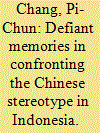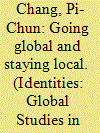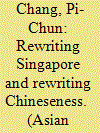|
|
|
Sort Order |
|
|
|
Items / Page
|
|
|
|
|
|
|
| Srl | Item |
| 1 |
ID:
191780


|
|
|
|
|
| Summary/Abstract |
This study considers Batavia’s first Chinese captain, Souw Beng Kong (1580–1644) as an example of the memory politics of urban Chinese Indonesians in Jakarta. It explores how and why he has been remembered in the contemporary era. While the stereotype of Chinese Indonesians has its roots in the Dutch colonial period, this study takes the Dutch institution of the captain as a framework to examine what is remembered as a way to bind group members together in a shared community of memory. This study argues that remembering Souw represents an implicit but defiant response to a long-standing negative stereotype that the ethnic Chinese in Indonesia are perennially alien outsiders.
|
|
|
|
|
|
|
|
|
|
|
|
|
|
|
|
| 2 |
ID:
116598


|
|
|
|
|
| Publication |
2012.
|
| Summary/Abstract |
Utilizing the 'Singapore Story', this study will explore cultural policies implemented and aimed towards cosmopolitanism, and how these policies have affected the international arts scene, which has led to a polarization within the community by excluding the elderly and disadvantaged members of the population from participating. Singapore's cultural policy has served the function of nation-building and at the same time goes with globalisation and thus calls for constructing a cosmopolitan yet patriotic citizen in terms of identity. This article considers the role of nationalism as a guide to the understanding of cultural policy discourses and argues that a top-down cosmopolitan construction of national identity in cultural policy discourses lacks representation of people's daily life.
|
|
|
|
|
|
|
|
|
|
|
|
|
|
|
|
| 3 |
ID:
137518


|
|
|
|
|
| Summary/Abstract |
This study proposes to view Lee Guan Kin (the former director of the Center for Chinese Language, Culture, and Division of Chinese at Nanyang Technological University) in the historical context in which the identity of Southeast Asian Chinese has transformed from overseas Chinese to ethnic Chinese, from Straits Chinese to Chinese Singaporeans. Based on the interview with Lee and the study of Lee’s numerous publications, this article exemplifies Lee’s enduring efforts on researching diasporic Southeast Asian Chinese and their ties with Chinese language and culture is a meaningful choice rather than an essentialist returning to ‘roots.’ In this article, Lee’s continuous engagement with China, Chinese language, and culture is illustrated by analyzing Lee’s assertion of ‘doing justice’ for Lim Boon Keng and Tan Lark Sye. Accordingly, this study is divided into four parts. First, the concept of Chineseness is reviewed and explored in the context of Southeast Asia. Second, the historical background of English-educated and Chinese-educated Chinese groups and their varying degrees of Chineseness are introduced. Then this study analyzes how Lee does justice for Lim Boon Keng, a baba who served as chancellor of Xiamen University for 16 years, and Tan Lark Sye, who was the founder of former Nanyang University. Lee believes that both prominent figures were unfairly and relentlessly treated by Chinese and Singaporean historiography, respectively, and therefore, Lee wants to do justice to them as a way to relocate their position in the context of Chinese diaspora and to redefine Chinese accordingly. Finally, this study argues that locality defines Lee’s Chineseness, her relation with China, China studies, Chinese identity, or Chinese culture. While locality defines Lee’s Chineseness, a diasporic stance characterizes her articulation, which challenged the homogeneous threat of identity imposed by the nation-state and the kind of Chineseness traditionally shaped by the authority of a sino-centric core.
|
|
|
|
|
|
|
|
|
|
|
|
|
|
|
|
|
|
|
|
|